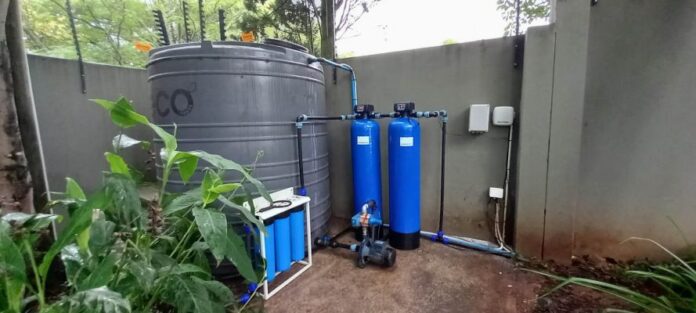More South African businesses and individuals are working to reduce their reliance on municipal services, such as water and electricity, or improve their water saving or management. This has seen water storage and treatment systems becoming more common place in commercial and residential settings.
Anelia Hough, water treatment consultant at Allmech, leading South African manufacturer of boilers and supplier of water treatment components, explains that while many industrial and agricultural operations have long had need of their own water storage and treatment facilities, it’s now more commonplace in 2023 for shopping centres, office parks, residential developments and even individual homes in certain areas to invest in their own systems.
These might include rainwater harvesting systems, boreholes, greywater systems, tanks that store municipal water, or a combination of these. Hough notes that the best system will depend on the quality and amount of water required, among other things.
For example, untreated rainwater, borehole or greywater can be used for irrigation or processes where drinking water quality is not a requirement, such as flushing toilets, or washing pavements, driveways or vehicles. However, Hough says, for some other applications, such as running a washing machine, basic pre-filtration will be necessary to improve sediment content and clarity of water.
“For drinking purposes, water needs to be treated with mechanical filtration to comply with the potable drinking water standards in South Africa (SANS 241: Drinking Water Quality Requirements),” she says. “Treated rainwater, borehole water or greywater can be used for applications such as drinking water or in consumable and non-consumable production plants.”
Borehole water
“Borehole water is generally considered safe for drinking. However, its quality varies from place to place,” says Hough. “Different factors can influence the quality of the water, such as climatic changes, soil types, surfaces, and even the type of rocks through which the water moves. The biggest problem, however, is human activities such as disposal of chemicals, and biological and microbiological material. The challenge is that certain types of contamination are not visible or easily detected. It is therefore important to have the water tested against Drinking Water Quality Requirements SANS 241 prior to use.”
Water testing and proper treatment can deal with common borehole water issues, including microbiological contamination, hard water, nitrate concentration, high sediment levels, high iron / manganese content, conductivity and low pH.
“Problems we commonly assist with when it comes to boreholes include dealing with faecal coliforms (the most common threat we identify is E. coli bacteria), high turbidity, water discolouration, and high levels of fluoride or sodium,” says Hough.
Storing water
Some areas of South Africa have experienced dry taps (whether due to prolonged drought, reservoirs running dry after power outs or power failures, or other local issues). This has prompted many developments, complexes and households to consider installing water storage tanks.
However, Hough cautions that water storage tanks should be cleaned and disinfected regularly. “Many people think if they use municipal or borehole water, the tanks stay clean and don’t need disinfection,” she says. “But that’s unfortunately not the case. If water has stood in a tank for weeks or months, it’s not necessarily still safe to drink. Disinfection should be considered when storing water in plastic water tanks. Chlorination, ozonation and UV filtration are all successful disinfection methods and to control micro-organisms.”
Getting a professional opinion
“The best time for involving a water treatment specialist is at the planning phase of the home or complex,” says Hough. “This ensures that you understand your water quality from the start and helps to avoid any surprises around any filtration or treatment you might need to consider, as water systems will vary in complexity and price depending on what’s required.”
She says the correct process if you want to use borehole water for drinking is to complete a Drinking Water Quality Requirements SANS 241 test, which is something a company like Allmech can assist with.
“Once you have the information, the right treatment for the borehole water will depend on the laboratory result of the water quality analysis. Some water quality problems are better handled through pre-filtration applications, including colour and odour problems, water hardness, or lime scale. Other contaminants can be best handled and filtered through water purification equipment such as reverse osmosis or ultra-filtration.”
Allmech offers a range of water testing and treatment services and systems, as well as repairs and maintenance for such systems, predominantly for commercial and industrial applications. “We also partner with a network of reputable service providers who can assist with smaller-scale requirements too,” says Hough. “We’d encourage people to get in touch with us and we can advise them on the best way to approach their water storage and treatment needs.”








